
Laka has a large collection of music (on vinyl, LPs & Singles and on CD or even VHS and Music Cassettes) supporting the anti-nuclear struggle. Most of these recordings are documenting a specific struggle in a specific era and location, and are living documents of that decennia long struggle. We’re focusing on officially released music, but if appropriate added some digital content too. Music is part of Laka's 'special collections' - the culture of the international anti-nuclear movement - which also includes a large collection of anti-nuclear songbooks, posters and graphic novels. If you have anything to add, want to make a contribution or an inquiry about a specific record, please do not hesitate to contact us.
This page is still under construction, more information on specific releases will be added soon
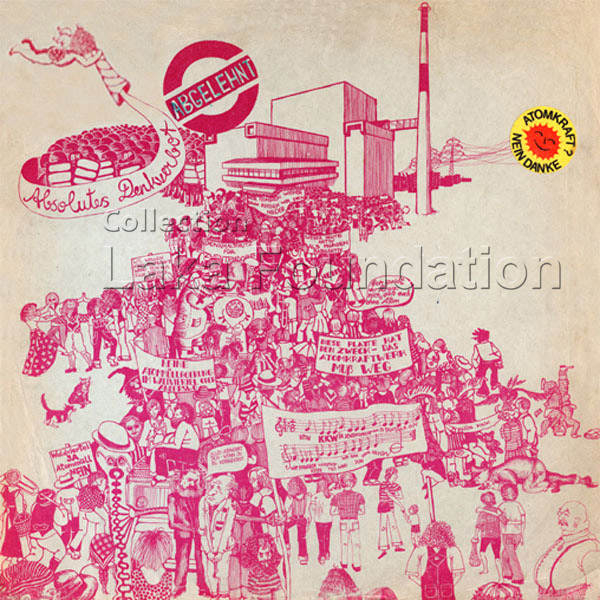
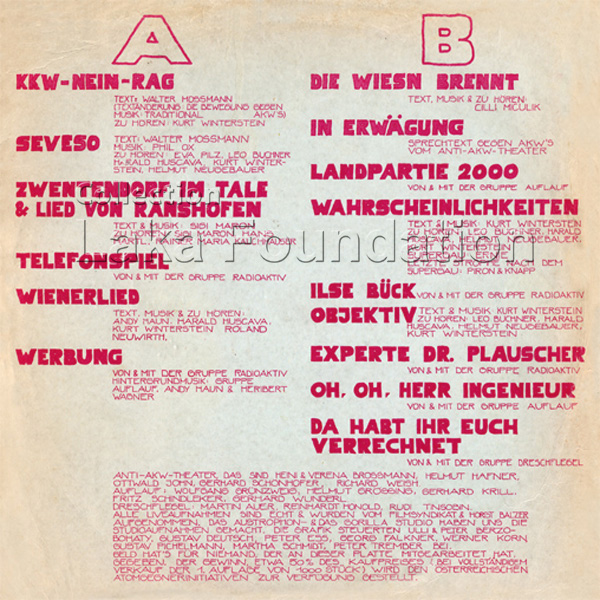
Various Artists
Abgelehnt. 1. Österreichische Anti-AKW-Platte
LP, 1977
"More and more people get the need to combine their personal interests with their work: but that is very difficult. Because at work we either don't know what we are doing something for, or we don't care, or we are horrified by it. The only way we know to at least partially undo this alienated situation is to actively engage with the things we want to change in our free time, to get involved. And such an attempt to do non-alienated work is the production of this record."(from the inner sleeve) In recent years, the Austrian movement against nuclear power plants has produced a wealth of songs that have been used at demonstrations, events and street agitations. In addition to these songs, there are also two songs from the German anti-nuclear movement that have been adapted for use in Austria.
This record is intended to document the growing broad resistance against the nuclear industry, to ensure the dissemination of the songs as a means of communication and to encourage as many people as possible to deal with the problems of nuclear energy and to actively participate in our fight against nuclear power plants.
Diese Platte hat den Zweck, das Atomkraftwerk muss weg! More
information [German].


Auflauf
Nix Verändert Si Von Söba
LP, vinyl, 1978

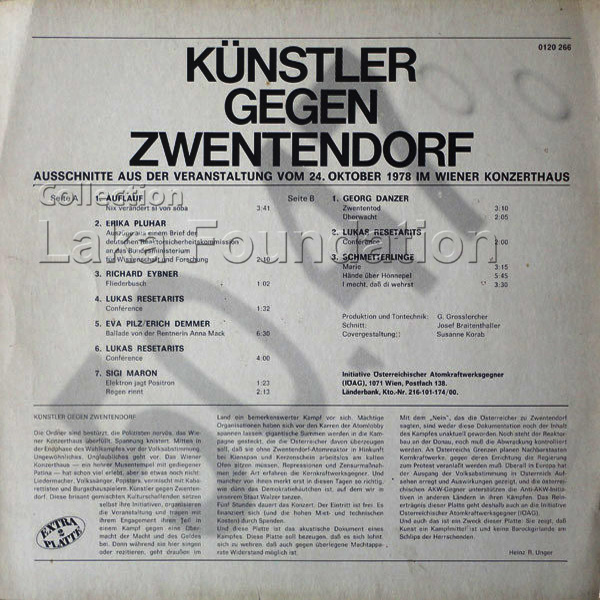
Various Artists
Künstler gegen Zwentendorf
LP, 1978
The concert on October 24, less than two weeks before the Zwentendorf-
referendum, at the Vienna Konzerthaus - a noble temple of the Muses - lasts five hours. Admission is free. It is financed (and the high rental and technical costs) by donations. Artists against Zwentendorf. Songwriters, folk singers, pop stars, mixed with cabaret artists and stage actors contribute with their commitment their part in the fight against a supremacy of the power and the money. While they are singing or performing, a remarkable struggle is going on outside in the country. Powerful organizations have let themselves be harnessed to the carts of the nuclear lobby, gigantic sums are being invested in the campaign to convince Austrians that without the Zwentendorf nuclear reactor they will have to sit unemployed by the cold stove in the future with pine shavings and candlelight. Repressions and censorship measures of every kind are experienced by the opponents of nuclear power. And some of them have just realized how thin the democratic skin is on which we waltz in our state.
About the purpose of this record witch excerpts of the concert: It shows that art is a means of struggle and not a baroque garland on the tie of the makers. This record is the acoustic document of a struggle. This record is to testify that it is worthwhile to resist, that resistance is possible even against superior power apparatuses.

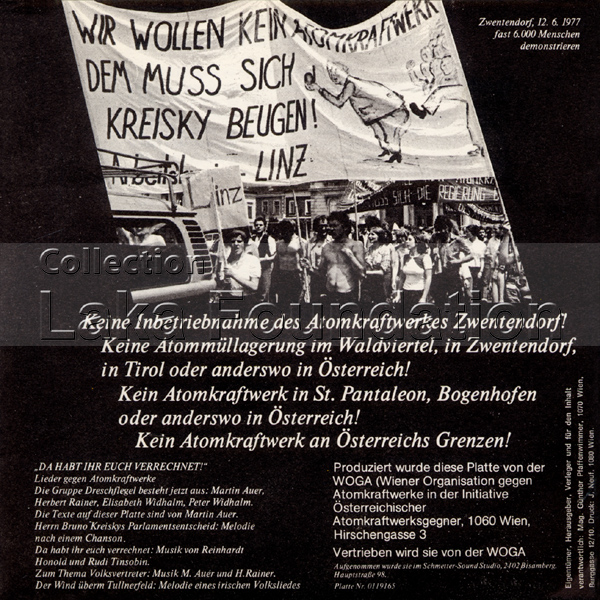
Gruppe Dreschflegel
"Da habt ihr Euch verrechnet!"
7" EP, 1978
Now you made a mistake! Songs against nuclear power plants; a single produced by the
Vienna organization against nuclear power plants. Martin Auer (see also
Akkord-Arbeiter) wrote the titlesong after the result of the November 1978 referendum.
From the inlay: 12 june 1977 was a day we had been impatiently awaiting for weeks. how many people will take part in the rally? will the people of zwentendorf and the surrounding area, who are directly affected, take part in the struggle against the nuclear power plants? is the ideological foundation of the opponents of nuclear power deep enough not to be confused and divided? for us, it was clear that we would support the movement against nuclear power plants with a fight song, which would contain the most important points, why we are against nuclear power plants, who the enemy of this movement is and how we have a real chance to defeat this enemy. the song should be suitable for marching along, you should be able to sing along with the refrain immediately, and yet you should be urged to listen carefully to the lyrics of the verses and not to immediately jump out of an emotional and perhaps uncritical feeling of solidarity. a certain degree of difficulty, therefore, which requires you to take a closer look at the song if you want to sing it. this level of difficulty is not chosen arbitrarily, but rather reflects - albeit in a reduced form - the difficulties that we have to overcome in order to be successful in our struggle. More
information [German].

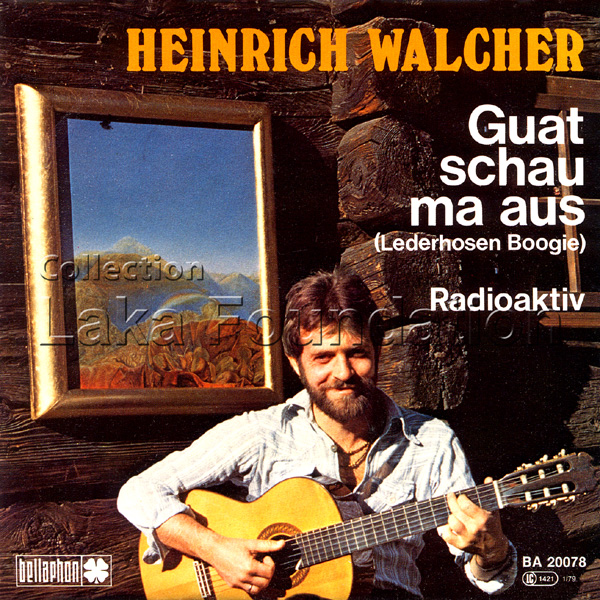
Heinrich Walcher
Radioaktiv
Single, 7”, 1979
Walcher is an Austrian painter and musician, born 1947 in Vienna. After quiting his medicine studies, he went to Vienna's ‘Academy of Applied Arts’ which he finished in 1972. In the same year, he topped the Austrian charts for several weeks with
Gummizwerg, a song about drug abuse. Although this single was released early 1979, Walcher wrote the song
Radioaktiv already in 1976 - long before the Zwentendorf referendum - because he “was skeptical about boiling water with nuclear fission”, and sang it at an event organised by the Vienna Students' Association. Altogether, Walcher composed over 100 songs but always focused more on painting.
In June 2022, he posted a clip of this song on
Youtube, stating ‘Leider wieder aktuell’ ('Sadly, relevant again').
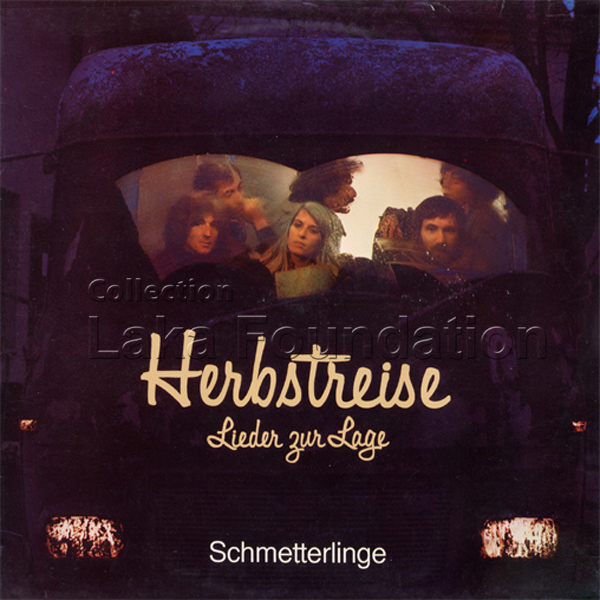
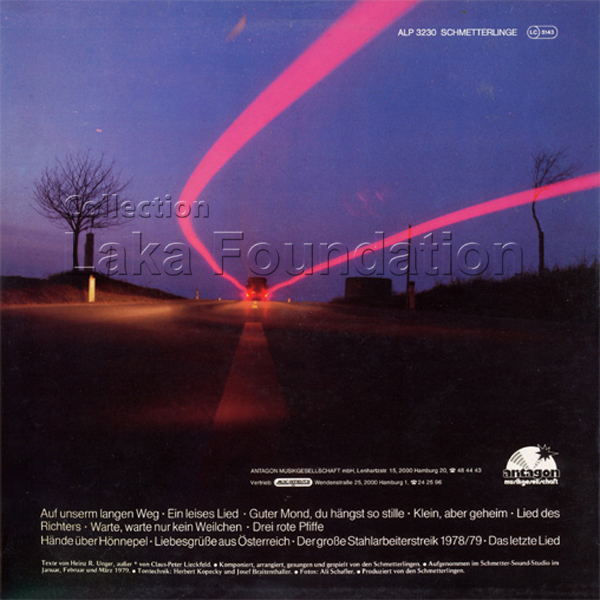
Schmetterlinge
Herbstreise - Lieder Zur Lage
LP, vinyl, 1979
The Austrian political rock band
Schmetterlinge [
bio] , founded in 1969, attracted attention especially during the 70s with countless tours combining cabaret elements, improvisations and, of course, a lot of music. Not only did it take four long (successful touring) years before the first album finally got off the ground, but in the time that followed it also repeatedly came to performance bans and radio boycotts. The final breakthrough came in 1977, when they were chosen to represent Austria at the Eurovision Song Contest with the song "Boom Boom Boomerang", which was actually about the record industry (where they took a respectable second-to-last place), but especially when the triple (!) vinyl album "Proletenpassion" was released, in which they dealt with the history of rulers and ruled. The album
Herbstreise -Lieder zur lage (Autumnjourney-songs about the situation), released in 1979, is probably the most contemporary political as well as the most musically sophisticated record of the Schmetterlinge. It takes a stand on the prevailing issues in Germany in 1979 - from sensitivities in the climate of the RAF, denunciation in the wake of the ‘Berufsverbote’, emancipation, the still existing ‘old boys network’ of the Nazi era, to the fight against nuclear power and in favor of the 35-hour week. The LP ‘
Herbstreise’ can be seen as the soundtrack of the "Deutschen Herbst".
More [German]. The song ‘
Hände über Hönnepel’ was released on the 1977 album ‘
Bauer Maas -Lieder gegen Atomenergie’ against the Kalkar fastbreeder and was one of the Schmetterlinge contributions on ‘
Künstler gegen Zwentendorf’, ‘
Liebesgrüsse aus Österreich’ would become the titlesong of an antinuclear compilation in 1987.
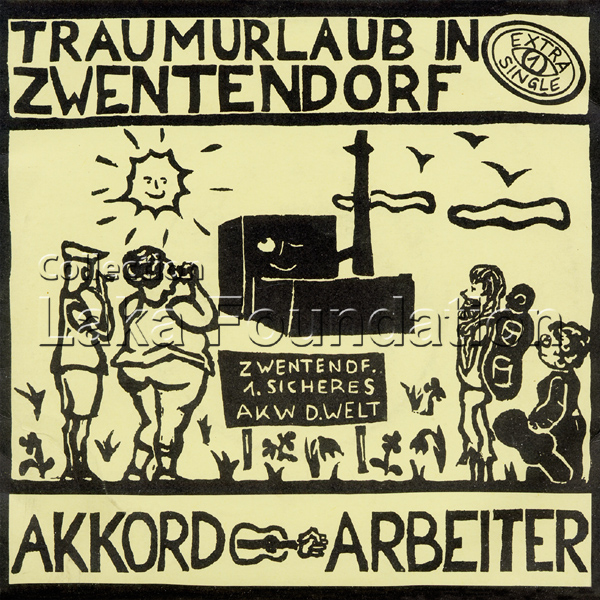
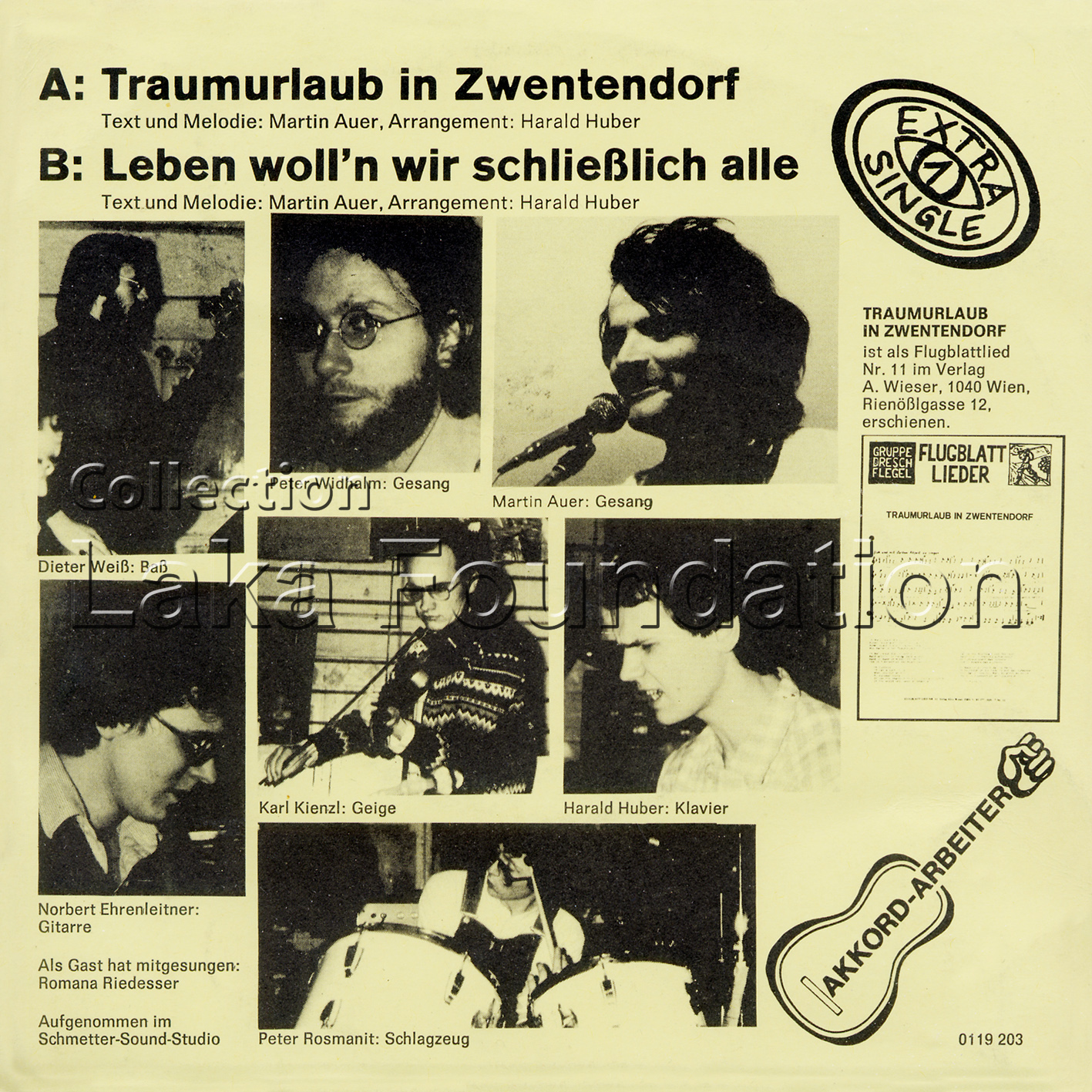
Akkord-Arbeiter
"Traumurlaub in Zwentendorf
B-side: Leben woll’n wir schließlich alle"
Single 7”, 1980
The group "Akkord-Arbeiter" existed from 1976 to 1981 and was formed by
Martin Auer. He is a writer, songwriter, internet artist and all sorts of other things and lives in Vienna, Austria. He wrote this song in 1979 when reading in the newspaper that American travel agencies were offering tours to Zwentendorf to see ‘the only 1:1 scale model of a nuclear power plant’. As is well known, the commissioning of the Zwentendorf nuclear power plant in Austria was prevented by a referendum in november 1978. Zwentendorf can actually be visited today. The B-side connects the fight against nuclear power plants with the fight against nuclear weapons. Since 2021 he has been involved with Scientists for Future. Martin Auer was also part of Gruppe Dreschflegel.


Various Artists
"Viele Bunte Vögel, Nein zum atomstaat, Erhard Busek"
Music Cassette, 1983
The atomic state is used here as a metaphor for the worst of the dinosaurs; people/politicians stuck in the old burocracies, squandering, in ever more concrete, and in the belief in nuclear power and nuclear weapons - the atomic state. Opposing them are the positive forces, the bunte Vögel (Colorful birds), who give the city color, who organize neighborhood meetings, who provide more greenery, more parks, and who fight to preserve and refurbish beautiful old houses. “
Die Saurier müssen aussterben, damit wir eine Zukunft haben. Die bunten Vögel haben ihnen den Kampf angesagt: mit Ideen, mit Phantasie und Ehrlichkeit. Die bunten Vögel werden gewinnen - mit Ihrer Hilfe.” (“The dinosaurs must become extinct so that we can have a future. The colorful birds have declared war on them: with ideas, with imagination and honesty. The colorful birds will win - with your help.")
Erhard Busek was a politician of the ÖVP, the Östereichische VolksPartei. In 1976 he resigned as Party Chairman and became active in the local Vienna branch. During the rise of the environmental movement, he gave the local party a green image (Bunte Vögel) and also
spoke out clearly against the commissioning of Zwentendorf in the Referendum in November 1978. He was vice mayor of Vienna from 1978 to 1987. In the municipal elections in April 1983, he distributed "Viele Bunte Vögel, Nein zum Atomstaat," something he had also done in the previous elections in 1978 when he handed out a music cassette recorded together with the fairly well-known group
Misthaufen. Busek and the ÖVP gained more votes in the 1983 elections for the third consecutive time, achieving their best result since 1949. Four years later, in the 1987 elections, the party lost sharply.

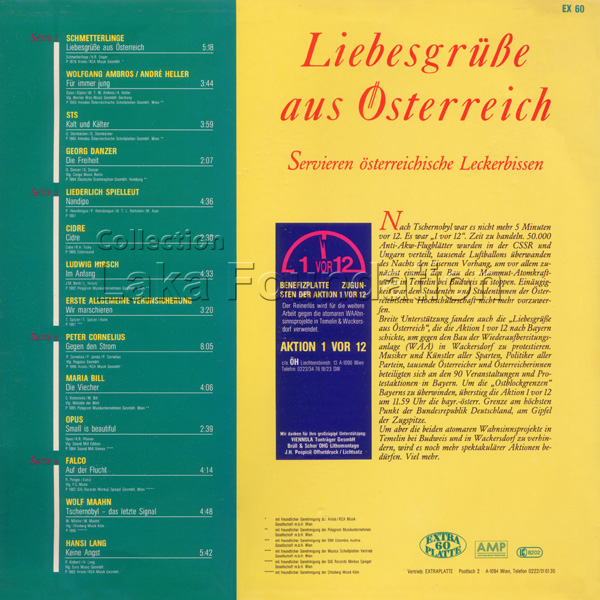
Various Artists
"Liebesgrüsse aus Österreich"
EP 12" double album, 1987
Many well-known artists, mainly from Austria, participated in this double LP, such as Falco, Opus, Georg Danzer, Erste Allgemeine Verunsicherung and Ludwig Hirsch. This compilation is a benefit record for the ‘Aktion 1 vor 12’, which campaigned against the planned construction of the Czech nuclear power plant Temelín on the Austrian border (50,000 anti-nuclear flyers were distributed in Czechoslovakia and Hungary) and against the planned construction of the reprocessing plant (WAA) Wackersdorf in Bavaria, Germany. During a 3-week tour, ‘Aktion 1 vor 12’ distributed one million newspapers, which met with great interest among the Bavarian population. In more than 20 evening events the Anti-WAAhnsinns-Theater were played. The final event was a big concert under the motto:
Harvest Festival for the Stricken Farmers, where many artists played. Motivated by this concert, the production of this anti-nuclear benefit record was started. With this record, all contributors show their protest against the nuclear power plant construction. More
information [pdf, German].
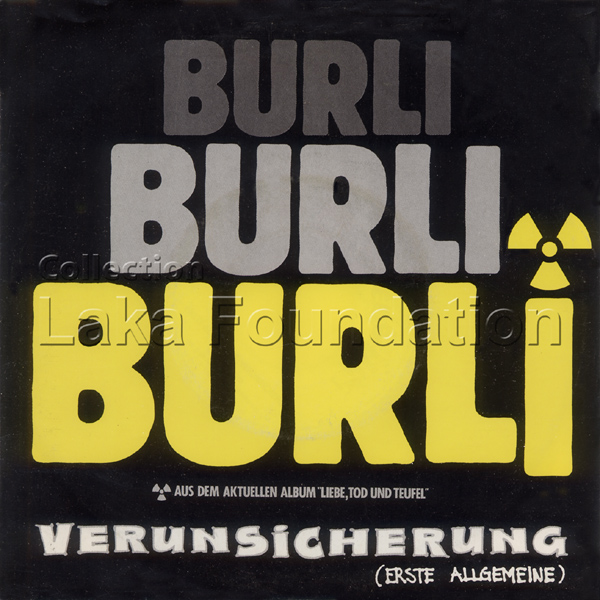
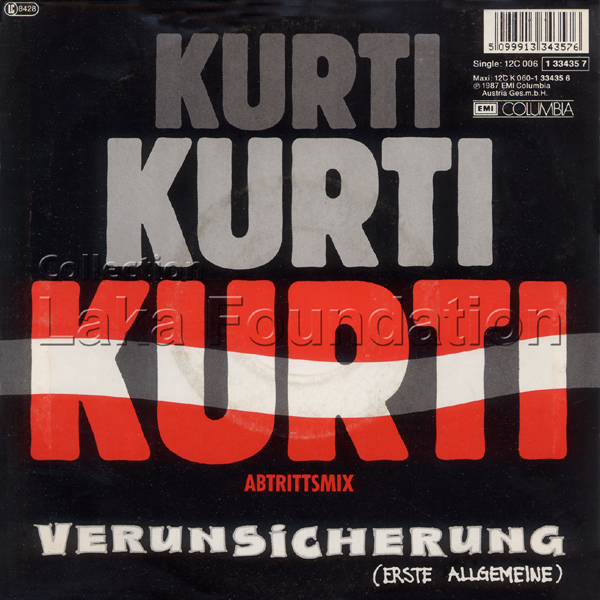
Erste Allgemeine Verunsicherung
Burli
Single 7”, 1987
Erste Allgemeine Verunsicherung (EAV) was an Austrian pop rock band formed in 1977 and dissolved in 2019. In the eighties and early nineties is was huge succesful in Austria and Germany. EAV is known for the fact that it often described current development humorously in its songs. The song ‘Burli’ was boycotted by the German radio station Bayern 3, because they thought it was making jokes about disabled people. Of course, this is not censorship, they hasten to note, but an "editorial decision that is supported by the top of BR". However, not a word was said about the massive criticism of nuclear power in ‘Burli’. The song appeared shortly after the Chernobyl disaster, and the band believed the radio stations didn't want to unsettle the public. Other broadcasters followed suit. Also Austrian radio station Ö3 renounced playing the song. For this reason Burli became a flop compared to the last singles.
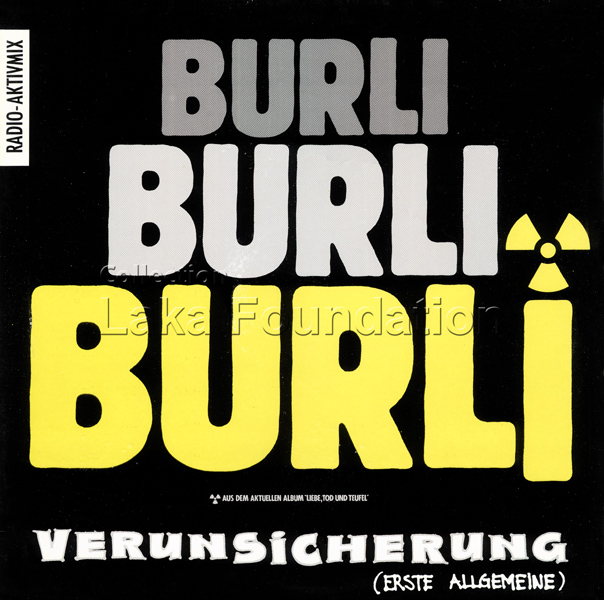
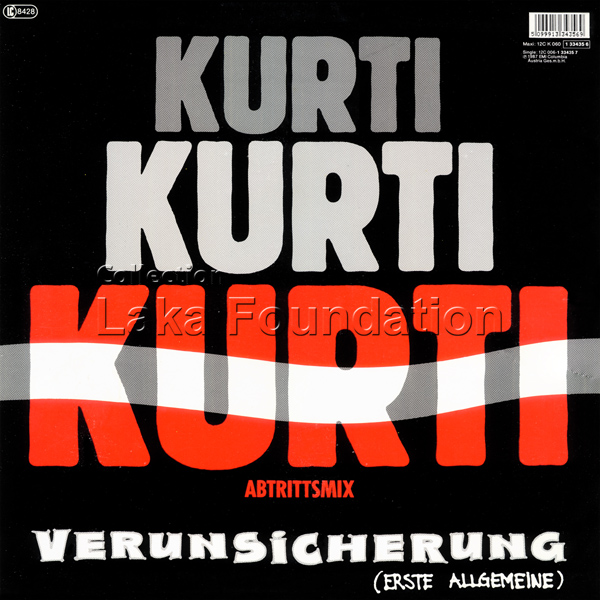
Erste Allgemeine Verunsicherung
Burli Radio-aktivmix
EP 12” vinyl, 1988
This is the extended 12” version of
Burli by the Austrian band Erste Allgemeine Verunsicherung. It was released in 1988 as
Burli (Radio-aktivmix) with different lyrics & production. More than 25 years later, in 2015, in response to Fukushima, EAV made a variation on ‘Burli’ with modified
lyrics and a different production: ‘Mrs. Fuckushima’. The song appeared on the album
Werwolf-Attacke (2015).























